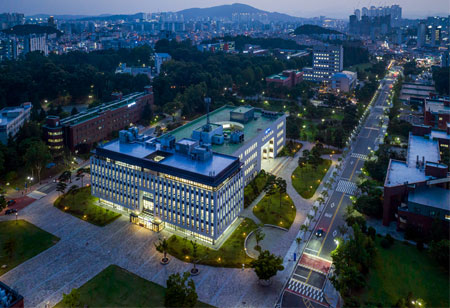Chung Buk National University: Leading the Way in Engineering Excellence & Collaborative Innovation

Chang-Seop Koh
President
In recent years, the surge in popularity for the College of Engineering can be attributed to several key factors. Firstly, there's the increasing importance of science, technology, engineering, and math (STEM) fields in the job market, driving a heightened demand for graduates with engineering degrees. The College of Engineering holds an advantage over others by specializing their programs to cater to industry demands, thus producing graduates with highly sought-after skills. Moreover, these universities often boast world-class faculty and state-of-the-art facilities, coupled with more affordable tuition fees compared to counterparts in the U.S. and Europe, which further attracts international students.
When it comes to international students selecting Engineering Universities in Asia, several factors come into play. Asian engineering schools offer a high-quality education, with programs designed to meet global standards. Additionally, Asia, being home to numerous multinational corporations and rapidly growing industries, provides students with diverse educational experiences and various opportunities for internships and employment. This combination of quality education, industry relevance, and diverse opportunities makes Asian engineering universities an attractive choice for international students.
One notable institution in this landscape is Chung Buk National University (CBNU). CBNU stands out with its 13 'Accreditation Board for Engineering Education of Korea' programs, which are equivalent to those accredited by the 'Washington Accord', a prestigious global engineering accreditation program. Almost 8,000 students have successfully completed these rigorous programs, attesting to the university's commitment to maintaining international standards. Furthermore, CBNU is actively developing engineering education programs tailored to the needs of both global industries and local communities. The university's involvement in major government-funded initiatives, such as the Project for Creative and Converged Engineering Talent, with a substantial total project cost of more than $800,000 (1 billion KRW), underscores its dedication to advancing engineering education and research on a global scale.
Chung Buk National University (CBNU) is one of the universities located in Cheonju-si, Chungcheongbuk-do, South Korea with over 70 years of history, 15 colleges, and 9 graduate schools. There are more than 2,000 faculty teaching members and conduct research for almost 20,000 undergraduate and 3,500 graduate students. Also, it has four specialized campuses (Gaesin-the intersection of humanities, social sciences, and applied sciences/Osong-a leader in Bio-health technology research/Ochang-ICT based education infrastructures/Sejong-a center of veterinary studies and research) for beginning a new future by establishing an innovative, prosperous ecosystem with the local community. CBNU is a university with excellent external performance, ranking first in the 'Quality Education’, ‘technology transfer income per faculty member’, ‘patent registration per faculty member’, and ‘Ratio of scholarship to tuition’ category of THE Impact Rankings as of 2023 among Flagship National University. In 2023, the university was selected as one of the 10 universities in the ‘Glocal University 30 Project’ supported by the Ministry of Education of the Republic of Korea, which aims to develop competitive regional universities as innovation hubs and will receive more than $70 million over five years. According to this project, CBNU is planning to integrate with Korea National University of Transportation by 2027 and is expected to become the largest national university in Korea, creating significant synergies to become a world-class research university.
President of Chung Buk National University (CBNU), Chang-Seop Koh, PhD is an individual with an illustrious career in industry, academia, and research. Before being appointed to the university in 1996, President Chang-Seop Koh worked as a senior researcher at Samsung Electro-Mechanics, working to industrialize various electrical products used in actual fields. He has been encouraging student’s talents and published excellent papers while he was a professor of Electrical Engineering at the College of Electrical & Computer Engineering for 28 years. He is a world-class researcher who is currently the Chair of Conference which is called ‘IEEE CEFC (Conference on Electromagnetic Field Computation) 2024’. He also worked for the Dean of College of Electrical & Engineering, Director of Office of Planning, Director of Business Incubation Center, and Director of Brain Korea 21 (BK21) Information Technology Project in the meantime. Finally, He was appointed as the 22nd president of CBNU in 2023 and he is working hard for the development of the university so far.
President Chang-Seop Koh says, “CBNU has remained steadfast in its commitment to advancing the nation's science and technology and nurturing exceptional talent in these fields. As a result, it has grown into a world-class research university in just over seven decades". He also says, “We will establish a future-oriented education and research network, break down academic barriers, and develop a new environment for cultivating creative and converged talent. Also, we will actively support our students to achieve their dreams and successfully adapt to a future society with the Gap-Zero Self-employment Program. To improve global research capabilities, we will reinforce cooperation with industries and administrative support centered on researchers”. Based on this experience, President Koh will implement a variety of strategies to cultivate talented people and expand R&D in the field of engineering.
A Notch Ahead in Imparting Quality Education
Chung Buk National University (CBNU) is distinguished by its two engineering colleges: the College of Engineering and the College of Electrical and Computer Engineering. The College of Engineering offers ten majors, including Civil Engineering, Mechanical Engineering, Chemical Engineering, Advanced Materials Engineering, Architectural Engineering, Safety Engineering, Environmental Engineering, Engineering Chemistry, Urban Engineering, and Architecture. Meanwhile, the College of Electrical and Computer Engineering features seven majors: Electrical Engineering, Electronics Engineering, Information and Communication Engineering, Computer Engineering, Computer Science, Intelligent Systems and Robotics, and Semiconductor Engineering. CBNU emphasizes a balance of theory and practice, with more than 40 percent of its courses (420 out of 1,007) dedicated to experimental and practical training as of 2023. Additionally, CBNU has an intensive program such as School of Bio-health, College of Bio-health University System, and some
cooperation courses for Bio Industry to prepare for promising industries in the future, also CBNU aims to foster professionals with the commercialization of technology capabilities specialized in the bio field using advanced biotechnology.
As a forward-thinking institution in the Fourth Industrial Revolution, CBNU has secured and managed a variety of significant engineering and IT projects. These include 16 national education and research initiatives such as the COSS Project (focusing on secondary batteries and vehicles), the BK21 Project in Phase 4, the Waste-to-Energy Project, UNI-CORE for Secondary Battery, and the Disaster Management Specialist Training Project. Other notable projects are the Human Resource Training for Smart Energy & New Industry Cluster Project, Urban Regeneration Professional Training Project, Leaders in Industry- University Cooperation 3.0, Semiconductor-specialized University, Convergence Open Sharing System, Future Vehicle Convergence and Open Sharing System, SW Centered University, and the Digital Innovation Sharing University. In particular, the future vehicle sector collaborates through the CO-Week Academy, involving 13 consortia, and partnerships with Auburn University in the U.S. and the Volkswagen Group in Germany.
The promise of CBNU is the commitment to be the best, a significant challenge for the future
“At CBNU, we have developed our own competency diagnostic test tool to set and measure the ‘core competencies, CHANGE’ linked to the image of university talent, and uses it to diagnose students’ core competencies every year. Here CHANGE depicts Creativity, Humanism, Activeness, Neighbor-minded, Global, and Expertise. With the results of the diagnosis, students can identify their strengths and weaknesses and design their campus life to improve a specific competency. We support them by offering various curricular and non-curricular programs and the analysis of the trend of changes in core competencies by year shows that students’ pro-activeness and community competencies continue to improve”, says Chang- Seop Koh, President.

Advanced Facilities & Industry Integration
Chung Buk National University (CBNU) integrates industrial expertise into its academic programs by hiring 'University-Industry Cooperation Professors'. These professors, numbering 29 as of now, possess over 10 years of industrial experience or hold a PhD with at least 7 years of industry experience. They lead university-industry cooperation projects and enhance the educational experience through their specialized knowledge. CBNU plans to expand this initiative by hiring more experienced professionals.
In the IT sector, CBNU boasts state-of-the-art facilities, including the IC Design Education Center (IDEC) for semiconductor design, a Clean Room (Class 1,000, 240 mt. sq.) for semiconductor fabrication, design laboratories, coding rooms, and an IoT playground. Additionally, the university features 228 high-tech classrooms equipped with ultra-short throw projectors and LED electronic blackboards to create a top-tier lecture environment. A notable facility is the Chungbuk Autonomous Driving Testbed (C-Track) at the Ochang Campus. This testbed, covering 83,096 mt. sq. includes 16 test roads across five zones mimicking real-world driving conditions. It supports the development of autonomous driving technology and the training of skilled professionals outside metropolitan areas.
To foster a creative learning environment suited for the digital age, CBNU has established a ‘Creative Lounge’ in its library. This lounge includes an XR Zone for virtual reality experiences, a Creative Media Studio equipped with advanced video production tools, and a Creator’s Cube for solo content creation.
CBNU enhances student learning through both regular courses and an array of non-curricular programs. In 2023, over a thousand such programs were offered, with almost 10 thousand students (nearly 75 percent) participating. Specialized non-curricular programs for engineering students include online job training camps, special lectures on startups, future car clubs, research lab internships, and the Secondary Battery COSS program. These initiatives ensure that students gain practical skills and knowledge essential for their careers.

Enhancing Employability & Innovation
Chung Buk National University (CBNU) offers an 'internship and on-the-job training program' in collaboration with companies to boost job performance and employability. By 2023, 175 engineering students had completed this program. Additionally, the 'capstone design' course allows students to create a project instead of a thesis, with over 2 thousand engineering students (over 55 percent) participating as of 2023. To support entrepreneurship, CBNU provides a 'Bachelor of Education in Business Start-Up' program, permitting students to take extended leaves for business ventures and earn credits for their start-up activities.
From the 'National University Development Project' funds, CBNU allocated $3.5 million and above to enhance the educational environment and over $400,000 specifically for engineering students. With an average scholarship of almost $2,000 per engineering student and a total of nearly $8.5 million in scholarships, CBNU leads in scholarship provision among national universities in Korea. The university also maintains strong university-industry collaborations with leading companies like SK Hynix and Samsung Electronics, ensuring high-quality education and substantial financial support for students.
"Inspiration, creativity, convergence, & innovation in education & research on problem-solving never stop on the CBNU campuses"
“At CBNU, we have signed academic exchange agreements with almost 300 universities in 55 countries around the world, including Asia, the Americas, Europe, Oceania, and Africa, and operate joint and multiple degree programs with 10 of them. As of 2023, over 300 students are in exchange with foreign universities, and more than 750 foreign students are pursuing degree programs here. Also, CBNU has a goal of attracting more than 1,000 students in the future related to the Glocal University 30 Project. In particular, engineering students are provided with the opportunity to experience overseas education programs. By participating in various national projects, they receive airfare and accommodation expenses for training and internships at overseas universities, research institutes, and industrial companies”, shares Chang-Seop Koh.
Advancing in the Future through Strategic Collaborations
Chung Buk National University (CBNU) has made significant strides in collaboration with the government, local regions, and industry. Notable achievements include winning the 'Semiconductor Infrastructure Construction Support Project' (2021), being named a 'Leading University for Technology Innovation' (2022), completing Korea's first autonomous driving test bed (C-Track) in 2023, and securing a win in the secondary battery field of the COSS Project (2023). Particularly, through the 'Glocal
University 30 project', CBNU plans to establish a BBCM Valley (Campus) to nurture converged talents in Bio, Secondary Battery, Semiconductor, and Future Mobility (BBCM) sectors. This initiative will include creating high-tech educational facilities, a start-up and job-invention incubator, and a joint R&D center. The institute aims to train over 1 thousand professionals in the BBCM fields and advance research and development by establishing an innovative convergence college, thereby providing a top-tier education and research environment. These efforts are designed to elevate CBNU to a global research-oriented university, fostering significant regional and industrial innovation.
🍪 Do you like Cookies?
We use cookies to ensure you get the best experience on our website. Read more...





